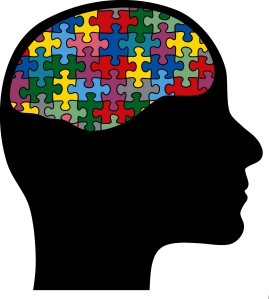Creativity is such an elusive feeling: some days, it’s there en masse, while on others writer’s block rears its ugly head, and it’s virtually impossible to get rid of it. Have you ever stopped to think why on certain days, you might feel more creative than others? When I asked myself this question, I realized that my creativity generally increases after a good night’s sleep, vigorous exercise, doing a rewarding activity, or meditating. And the chemist in me said, “Whoa, all of these activities influence your brain’s chemistry. Think there’s a connection there?” The answer, of course, is a no-brainer.
I have an extensive chemistry background from my “previous life” as a pharmacist; in pre-pharmacy Organic Chemistry classes, I spent hours poring over molecular structures and their reactions, and in pharmacy school I learned about biochemistry. I was particularly intrigued by the chemistry of the brain, and the way that certain behaviors and medications affect it.
Our creativity is directly affected by neurotransmitters in the brain. Neurotransmitters are chemicals native to our bodies that transmit signals from one neuron to another. The two neurotransmitters that affect our creativity the most are seratonin and dopamine.

There’s a lot going on in these brains of ours, and being knowledgeable about our brain chemistry can make us more creative. Picture: toptenreviews.com
Seratonin is the neurotransmitter that regulates memory, learning, sleep, and mood, among other things. I don’t know about you, but when I’m feeling happy and fulfilled, my creativity skyrockets. Sometimes you just feel happy, but have you ever wondered why? If the sun’s out, you’ve just exercised, or you’ve slept well the night before, you’re generally much happier than you’d be if circumstances were the opposite. Guess what: bright light, exercise, and a good night’s sleep all increase the seratonin in your brain, leading to increased feelings of well-being and amped-up creativity. Check out this article, which explains ways to increase seratonin without drugs. Scientifically speaking, my advice to anyone who wants to pump up the creativity by manipulating seratonin is this: have a restful 8-hour sleep, exercise 3-5 times a week, and get outside every once in awhile. If it’s cloudy out, turn on some bright, cheery lights. Your creative writing project will thank you!
Dopamine is the neurotransmitter that is related to motivation, emotional arousal, and reward and pleasure centers; the more dopamine circulating in the brain, the more creative the person will probably be. Check out this article called The Mad Artist’s Brain: The Connection Between Creativity and Mental Illness. It may sound weird, but a study found that both schizophrenics and creative people who demonstrated unusually high abilities to think outside the box had lower dopamine receptor activity in their brains than average people. Dopamine, like seratonin, increases with exercise: just one more reason to get to the gym. Meditation and activities that feel rewarding also increase dopamine, so my best practical advice to fuel your creativity and increase your dopamine levels would be this: do yoga. It’s the perfect marriage of exercise, meditation, and rewards. I always feel more inspired after a yoga session… This will, in fact, be a topic of one of my future blog posts.
I hope this brief science lesson has inspired you to take your creativity to new levels…by manipulating it at the source. Best of luck on all your artsy endeavors!

Reblogged this on SEE Science Center Blog and commented:
There’s science behind creativity. Take a look into this brief science lesson that we had to share!
[…] a known scientific basis behind this, and a lot of it heralds back to the blog post I wrote about brain chemistry and how it influences us in our professional and personal lives. In this case, the active hormone is oxytocin, or the […]
[…] a known scientific basis behind this, and a lot of it heralds back to the blog post I wrote about brain chemistry and how it influences us in our professional and personal lives. In this case, the active hormone is oxytocin, or the […]
The higher the serotonin, the lower the dopamine. I read something like this, correct me if im wrong.